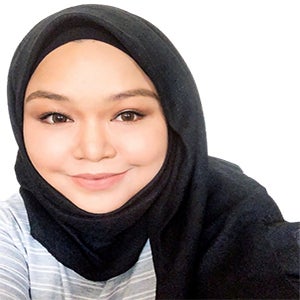Maryam Pagi Ke Malam: A look into religious bureaucracies that are in Malaysian syariah law
This film raises various issues, among which are feminism, xenophobia, sexual orientation, class struggle, monarchy and racial issues. It is blended in a story that shows Maryam's struggle to stand on her own beliefs, even though the world takes an opposing stance.

There's something about movies with a religious or a little controversial undertone that scares the predominantly (malay men) conservatives.
But is it not evident that the more you insist on a movie being banned or not shown locally, the more it piques the interest of viewers?
The film in question is called “Maryam Pagi Ke Malam” and follows the story of Maryam, a 50-year-old gallery owner from an aristocratic family played by Datin Sofea Jane who feels isolated after her father (Omar Abdullah) refuses to consent for her to marry her younger foreign boyfriend from Sierra Leone.
This film raises various issues, among which are feminism, xenophobia, sexual orientation, class struggle, monarchy and racial issues. It is blended in a story that shows Maryam's struggle to stand on her own beliefs, even though the world takes an opposing stance.
In terms of ideas, the film explores Maryam's alienation when she decides to fight for what she believes in. Maryam's choice to marry a man from West Africa has created internal and external conflicts that make the audience feel Maryam’s frustrations as she tries to have a family of her despite the odds stacked against her.
The feel of the film plays a lot with deep feelings, with minimalistic and simple camera work. At one point, Maryam questions her life and intentions and why getting married as a Malay muslim woman in her fifties is just so difficult.
The external conflict starts to suffocate Maryam from three directions, first from her family who are completely opposed to her decision to marry. Her father who is from royal blood, has refused to be her ‘wali’. In islam, the bride's lawful guardian usually an elder male and the father of the bride are responsible to give her away in marriage to a suitable man.
By refusing Maryam’s request, it has made her decision to marry more complicated and difficult. He sees her decision to marry a foreign man from West Africa as tainting the sovereignty of the royal blood, rather than a solution to his daughter’s loneliness and desire to build a more meaningful life.
Her next challenge is the bureaucracy of the syariah law system which is mostly, let’s be really honest here, prejudiced against women. This point was illustrated in a scene where Maryam meets a religious teacher who constantly highlights verses of the Quran, but his attitude and soul are not in line with what he says.
Maryam is also tested by the community, namely her friends who also question her decision to marry a foreign man who they feel did not match her status.
All these external conflicts lead to an inner conflict, and she spends a large part of the movie pondering her conflicted feelings.
Ultimately what Maryam wants, which is to get married, end her single life and have a companion seems to be such a ‘difficult’ thing for everyone to accept.
Why are the people around her questioning her boyfriend's status and his lust, her loyalty to her country instead? Why don't they help with her efforts to get married and to live a happy and fulfilled life? These people who are supposed to be her support system are instead making the process more complicated.

The theme of the film also centers around feelings of loneliness and desperation with Maryam fighting with her own choices. The look on Maryam's face during the scene in the car alone after calling her lover lets the audience know that Maryam starts to feel depressed and begins to question all of her decisions but is still firm with her choice.
Technically, this story is presented in a very minimal style. The location and set design is not very grand, but still tells a story.
Meanwhile, Maryam wore a short yellow dress which the director has described as symbolic, that the problem Maryam faces does not only happen to most people, but it is also faced by those who are influential. This film is shot in portrait form which shows Maryam as the central character which ties the story together.
Overall, Maryam Pagi Ke Malam is a film that deserves to be watched and reviewed by Malaysians.
Recently the film won two awards at the 21st Asian Film Festival in Rome, Italy.
The film directed by Badrul Hisham Ismail won Most Original Film while Datin Sofia Jane won Best Actress for portraying the protagonist Maryam.
The film faces local screening hurdles due to controversies surrounding its lack of “approval” from the Malaysian censorship board.
Badrul said in a news report last week that the wins were a "pleasant surprise and honour".
“We couldn't have a wide release of the film here so, it's really encouraging to be recognised and celebrated elsewhere," he said.
Sofia thanked the Asian Film Festival for showcasing the film and thanked the jury for her award.
The film which debuted at the International Film Festival Rotterdam 2023 in January 2024 as the sole Malaysian representative, remains inaccessible to Malaysian audiences in local cinemas.
At 90 minutes, it is funded by Penjana Kreatif and the Arthouse-Festival Feature Film Grants from MyCreative Ventures and produced by Anomalous Films.
Besides Sofia, Maryam Pagi Ke Malam also stars Susan Lancaster Vanidah Imran, Roslan Madun, Azman Hassan, Pekin Ibrahim and Bella Rahim.
Personally I think its time we allow local supposedly controversial movies to have their airtime, even more so when it discusses difficult topics, so that perhaps our society and community as a whole can develop a more extensive worldview and know that some things are not just black and white and that a grey area most likely exists.











